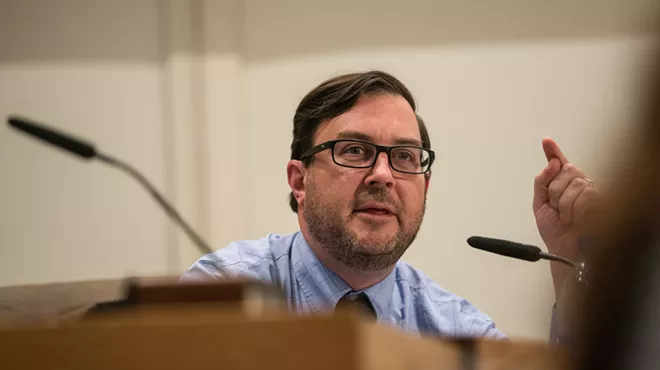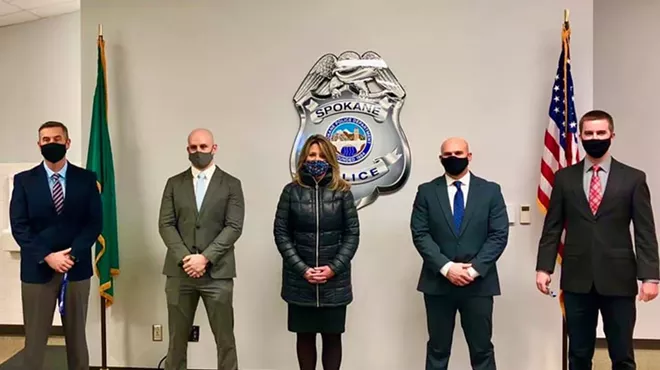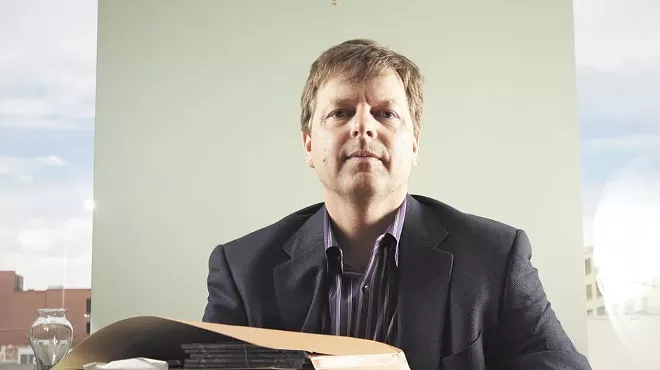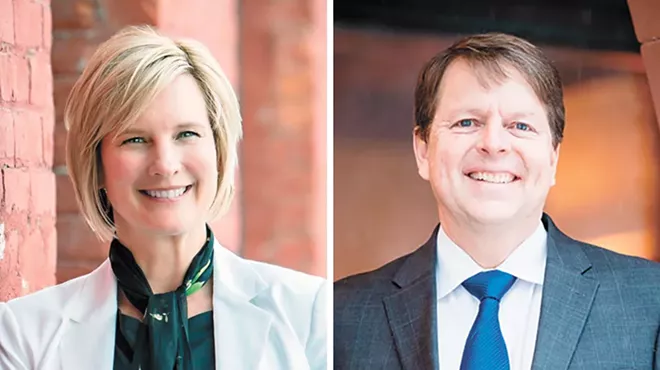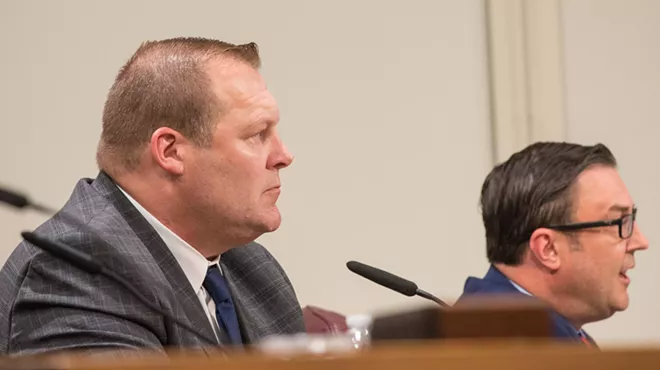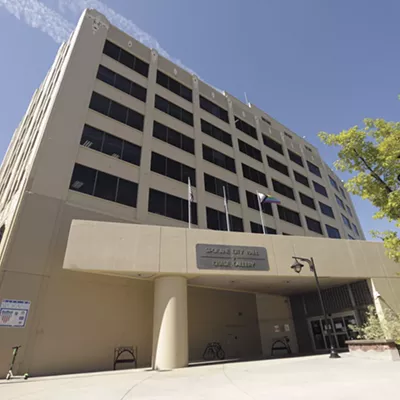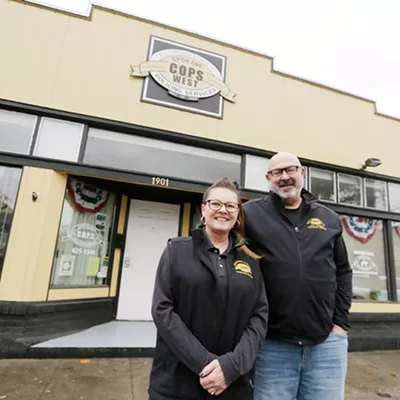
But mayoral candidate David Condon, by contrast, was running on a platform of police accountability. Condon ran ads featuring a prominent Democrat condemning Mayor Mary Verner’s handling of the scandal.
"I'm a lifelong Democrat," said former Spokane County Democratic Party Chair Tom Keefe. "But after years of cover-up, deceit and obstruction of justice in the Otto Zehm case, I cannot in good conscience support the re-election of Mayor Mary Verner."
Condon accused "bureaucrats at City Hall" of wasting taxpayer money to hide facts, said the assistant city attorney who engaged in the cover-up should be fired, and promised that "when I’m mayor, I will insist we have a strong and independent police ombudsman even if it means reopening contract negotiations with the guild."
Flash forward to 2019. A lot has changed in eight years. Today, the mayoral candidate Condon endorsed, Nadine Woodward, runs ads celebrating her Police Guild endorsement. To her, it's all about how she's the better candidate on public safety.
They got out door belling with her. She argues that she's the mayor who will truly listen to the cops, who truly cares about public safety.
"How can you be the mayor of this great city and not want the support from your Police Department?" she asks at the Homeless Coalition forum.
Her opponent, City Council President Ben Stuckart, on the other hand, told the Spokesman-Review he didn't want the guild's endorsement to begin with, saying, “I’ve never asked for their endorsement and I never will."
Woodward has taken that comment of Stuckart's and hit him over the head repeatedly.
When questioned on this statement in public, Stuckart has often stressed the idea that it would "totally inappropriate" to seek the Police Guild endorsement when the mayor would be tasked with finalizing contract negotiations, which has been open for three years.
But that didn't make sense as the only reason. Why would he say he'd never seek the guild's endorsement if his concern was simply that he'd need to negotiate the contract?
"You have said that you would not seek, nor would you want the Police Guild's endorsements, which I am proud to have," Woodward pressed him during last week's Pints and Politics forum. "You said so because you have to negotiate their contract. Yet you freely take the endorsement of the Firefighters Union, and have gone as far as during union negotiations with the firefighters, handed over, privileged and protected information to a union boss, at the betrayal of our taxpayers. How was that OK, and what do you have against our police officers?"
Nothing, Stuckart countered, pointing to his support for the public safety levy and reiterating that he didn’t want to seek an endorsement while negotiations were still going on.
Woodward got some of the details wrong. In 2014, Stuckart was fined for an ethics violation after leaking a confidential email to then-fire union President Don Waller, but it wasn't during union negotiations. It was during pending litigation over the mayor's plan to turn the Fire Department into a fire division that allowed him to hire and fire officials more easily.
Woodward's campaign declined a general sit-down interview request with the Inlander last week, but her underlying question of Stuckart was a reasonable one: Stuckart loves unions. ("Bastards," Stuckart wrote in a text message to his legislative aide when the Supreme Court passed a law allowing public employees to opt-out of paying union fees.) He's been a particularly close ally of the powerful fire union, which has repeatedly endorsed him and has financed independent expenditures in his favor.
Why was he so critical of the Police Guild? When the Inlander pressed Stuckart on this issue, Stuckart acknowledged that his concerns with the guild went beyond bargaining issues. To him, it's about accountability.
“They don’t want a mayor who wants to hold their feet to the fire, and I don’t want their endorsement,” Stuckart says.
For more than a decade, the Police Guild has pushed back against the authority of the police ombudsman, the independent watchdog position voters chose to create in the wake of Zehm's death.
In 2013, Stuckart and the rest of the council voted to reject a police contract, arguing that it didn't provide enough independent investigative authority for the ombudsman.
"I can't expect the Police Guild endorsement when I led a [no] vote of 7-0, when the contract didn’t empower the ombudsman," Stuckart says. "The last thing they want is someone who is going to negotiate with them to get power for the ombudsman."
Stuckart argues the parts of the ombudsman ordinance that don't deal with discipline be stripped from the guild contract, and the ombudsman's investigative authority be expanded.
"I don’t believe they’ve been acting in good faith on the ombudsman," Stuckart says of the Police Guild.
In the past two years, Ombudsman Bart Logue has tussled with the guild over issues like access to the department's internal affairs database and unredacted body camera footage.
Right now, Logue says, he doesn't even have the ability to write a closing report about specific cases.
"If there is something to say, I’d like to investigate that and write a report," Logue tells the Inlander. "I don’t think oversight should exist in silence, which is kind of like what I think the Police Department would like it to be."
Stuckart says he's concerned about that limitation. He says he's concerned about the decision to no longer require violations of the city’s use-of-force policy to automatically be reported to internal affairs. Logue calls it an "affront to community accountability."
And then there's the sort of video that, if released, could take the topic of police accountability off the back burner and stick it directly under the broiler.
The footage, from last February, features Spokane Police officers allegedly threatening to shoot a motorist in the head, smash his car windows with a baton and then shove a police dog into his vehicle.
Stuckart and other council members wanted to see it. But because of an agreement the city negotiated with the Police Guild, the council members would be required to sign a nondisclosure agreement before watching it.
The guild, meanwhile, demanded Logue be removed from the investigation into the incident, but Logue refused.
"This needs to be out," Stuckart told the Inlander in May. "The public needs to be talking about it. And everyone should be able to see this."
It's unclear if the video, part of an internal affairs investigation, will be released before the election.
The Police Guild did not return a request for comment, but in July told the Spokesman-Review that the ombudsman question did come up during their endorsement interview, but that public safety was their highest priority. In particular, they praised Woodward’s promise to move the downtown police precinct out of the Intermodal Center and into a more central location downtown.
“The precinct, moving that down to the core of downtown, we are very much in favor of,” Police Guild Vice President Tim Schwering told the Spokesman-Review.
On one hand, Logue says, "the mayor should have nothing to say with the inter-workings of the ombudsman office."
But he also says the mayor should make sure the authority of the ombudsman is enforced.
"When the guild questions the authority, it’s up to the city administration to say, 'This is the law,'" Logue says.
Today, Mayor Condon doesn't believe the ombudsman needs more power.
“Civilian oversight of our Spokane Police Department, and particularly use-of-force incidents, is critically important," Condon says in a statement. "I believe the current process, defined in an ordinance that was unanimously agreed to by the City Council in 2014, balances transparency, independence and accountability.”
And neither does Nadine Woodward.
"Within the city charter, the authority of the ombudsman is limited, and it needs to stay that way," Woodward said at a League of Women Voter's forum.
She stressed that she believed in the police oversight model that voters chose, but also suggested that the ombudsman conflict may be one reason the Police Guild has gone for three years without a new contract.
"I do believe the ombudsman situation is hampering that ability to get that contract negotiated," Woodward says.
Not only that, but at a Coalition of Color forum she calls for a way to further limit the power of the police ombudsman, at least in terms of the amount of time he serves.
She calls for a new ombudsman every time a police contract is negotiated.
“I want a new fresh face and a fresh perspective in that position every time that contract comes up, so that we don’t create another layer of bureaucracy within City Hall,” Woodward says.
Whether that policy result would mean the immediate termination of the current ombudsman is unclear. Logue was recently unanimously chosen to serve another three-year term earlier this year.
Logue, at least, thinks it's a terrible idea.
"That person would always be behind the curve," he says.
By the time they really figure out the personalities and how to be effective, he figures, they'd be out of the job.
The United States Ombudsman Association recommends giving an ombudsman a longer term than the three years Spokane offers, Logue notes, and urges governments to allow an ombudsman to be reappointed each time.
The last time we lost the ombudsman, Logue says, it took 17 months to find a new one. And since it takes seven years to vest with the city, a term-limited ombudsman wouldn't be able to get city retirement.
"It gets to be a much harder position to fill," Logue says.
As for the notion that his office risks becoming another layer of bureaucracy?
"That logic is flawed. It sure makes it sound like I have a whole lot more power than I do," Logue says, chuckling. "Holy moley."
Logue says he's spoken to Stuckart plenty about ombudsman issues. During the primary, he says, he sat down for hours with candidates like Shawn Poole and Kelly Cruz.
“One of the candidates has never spoken with me to find out what we do," Logue says. "I've never spoken with Nadine Woodward at all. Never had a request. Never nothing."
Still, there's one area where Woodward wants more transparency with the Police Guild than Stuckart: union negotiations.
Is the Police Guild demanding more restrictions to the ombudsman's powers behind closed doors as part of contract negotiations? We don't know, because those negotiations are held in private.
Woodward supports a city initiative that would require those union negotiations open to the public.
"I think that the voters deserve to see how the sausage is made, when it comes to negotiating union contracts," Woodward said at a League of Women Voters forum.
But Stuckart opposes the ordinance, arguing that state law makes those types of unilateral changes illegal. City Council presidential candidate Breean Beggs, who drove the creation of the police ombudsman ordinance a dozen years ago, comes to the same conclusion.
And even if it wasn't against state law, Stuckart argues that it would be bad form to unilaterally change bargaining positions without getting the approval of the other side.
For either candidate, getting the support of an influential union can be a double-edged sword. For Woodward, it's allowed her to counter criticism about her vote against adding more police officers and to claim that she's the true voice of public safety.
Inside City Hall, the Police Guild gets praise as well as criticism.
"I'm a big fan of the Police Guild," city of Spokane Chief Financial Officer Gavin Cooley says, praising their ability to work with him in budget negotiations. "They have really tough jobs. Anyone who has done a ride-along knows it’s a really, really stressful tough and dangerous job. You’re on edge for days afterward."
But the guild also comes coupled to serious controversies like that of former Spokane Police Guild President John Gately.
Gately was president of the Spokane Police Guild when he tipped off a cop who raped a fellow Spokane Police officer about an investigation. (Gately was charged with obstructing a law enforcement officer, but the court case ended in a mistrial.)
Gately not only got to keep his job with the Police Department, the guild formally objected to what little punishment he did receive.
Some of the controversy unions face come with the territory. It's their job to defend their members. They can get sued if they don't.
Kevin Richey, head of the Spokane County Deputy Sheriff’s Association, says the law enforcement union serves an important purpose. Sometimes they're almost in a defense attorney role. They're not there to protect bad cops. They're making sure that the rights of officers and deputies are protected.
“What we’re doing is making sure that due process is followed,” Richey says.
Meanwhile, Stuckart's support from the fire union has given him a powerful ally both inside City Hall and during elections. Yet the Fire Department has had its own string of controversies. And not just calendar-photo-shoot related.
Last year the city's human resource department concluded that former fire guild President Don Waller violated the city’s sexual harassment policy that prohibits “sexual comments, innuendos, suggestions, jokes or pressure for sexual favors.” (Waller objected to this finding.)
The fire union's political efforts have also repeatedly come under scrutiny. This year, the Fire Department's political action committee was hit with yet another public disclosure complaint for failing to properly identify the source of more than $66,000 in donations.
When unions get particularly involved in the election of one candidate or another, it's easy for their opponents to use that to attack their independence.
At last week's forum, Woodward charged that Stuckart is "bought and paid for by the unions."
Though not, presumably, by the Police Guild.

